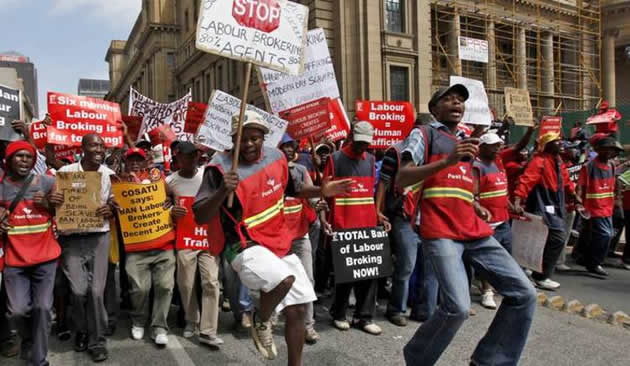
The Sunday Mail

PARLIAMENTARY elections in South Africa, due this May, promise to be the most competitive since 1994, when the first fully democratic poll brought the African National Congress (ANC) to power. The ruling party has never since pulled in less than 60% of the national vote. But some of its once sturdy supporters are drifting away. The Democratic Alliance (DA), the main opposition, has been deemed “too white” to have a broad appeal for the black majority. That may now change.
On January 28th the party announced that Mamphela Ramphele, a heroine of the fight against apartheid, will be its candidate for president.
Helen Zille, the party’s leader, hailed the embrace of Dr Ramphele as a “game-changer”. The ANC’s role in ending apartheid will be much trumpeted in the run-up to the 20th anniversary of that 1994 election on April 27th. But the DA’s new recruit has “struggle credentials” of her own. As well as being a well-known academic and a former director of the World Bank, she was also the companion of Steve Biko, leader of the Black Consciousness Movement, who was murdered in police detention in 1977.
Even against a revamped opposition, the ANC still looks sure to win. But if the party’s share of the vote were to fall below 60%, its decline could accelerate. Corruption scandals have hurt the popularity of Jacob Zuma, the ANC’s leader and South Africa’s president.
In December he was booed by sections of the congregation at a memorial service for Nelson Mandela in Soweto, the vast urban sprawl on the edge of Johannesburg.
That was but one sign of a deeper disenchantment. IPSOS, a local pollster, recently found that support for the ANC had shrunk to just 53% of eligible voters. The corresponding poll six months before the 2009 elections, when the ANC carried almost two-thirds of the national tally, found that 63% would vote for it. Half of ANC voters, according to a poll in December, thought that Mr Zuma should step down because of the $20m of public money spent on his private home. A third said they were less likely to vote ANC because of the scandal.
The party’s troubles are multiplying. The economy is in bad shape. Barely four in ten people of working age have jobs. Most of the jobless masses are young. An alarming slide in the rand forced the central bank to raise interest rates from 5% to 5.5% on January 29th, despite the economy’s weakness (see article <http://www.economist.com/news/finance-and-economics/21595485-developing-economies-struggle-cope-new-world-locus-extremity>).
South Africa relies heavily on foreign borrowing to pay for an excess of imports over exports. As monetary policy in America slowly gets back to normal, foreign investors are choosier about which countries they lend to. South Africa’s appeal is waning.
The ANC is losing friends at home, too. Its alliance with the Congress of South African Trade Unions (COSATU) is splintering. The National Union of Metalworkers, the country’s largest union, has said it will not back the ANC at this year’s elections.
The break is seen as a first step towards the founding of a Labour Party to rival the ANC. Zwelinzima Vavi, who was suspended in August as general secretary of COSATU, is a popular figure on the left who could lead such a party. A voluble critic of corruption, Mr Vavi was offered an ANC position in the next parliament to lure him back into the fold. He turned it down.
The ANC manifesto looks as if it was crafted in part to get the unions (if not foreign investors) back onside. It promises to ensure that tax breaks for employers that hire youngsters will not lead to older workers losing their jobs. There is a pledge to extend union pay deals across all industries. A national minimum wage is mooted. The manifesto is dedicated to Mandela, whose image is certain to feature prominently in the campaign.
Yet the power of appeals to the party’s heritage can only fade. The metalworkers are just the latest group to break with the ANC. In 2008 a faction close to former president Thabo Mbeki left to form the Congress of the People, known as COPE, a rival party that won 1m votes in the 2009 election.
Last year a former leader of the ANC Youth League, Julius Malema, launched his own political party, the Economic Freedom Fighters, which will take votes from the ANC.
The booing of Mr Zuma in December shows there are also limits to party loyalty.
“You now have a critical mass of people who say the ANC is not the ANC of Mandela and you’re not betraying anyone if you leave it,” says William Gumede, a prominent analyst.
Should the ANC’s share of the vote fall into the 50s, it will be easier for voters to imagine the party eventually losing its majority.
That in turn might spur loyal but disgruntled voters to switch sides at local elections in 2016. Mandela’s death and the 20th anniversary of the end of apartheid could as easily free voters from their ties of loyalty to the ANC as bind them tighter. There is no denying that South Africa has made some progress since 1994, says Jonathan Moakes, chief executive of the DA. “Our job is to contrast Zuma’s ANC with the ANC of yesteryear.”
Plainly the ANC faces its toughest election campaign since 1994. Yet grumbles about Mr Zuma and his leadership may not translate into a surge of votes for other parties. For all her accomplishments, Dr Ramphele has failed to make much of an impact with potential voters since she launched her own party, Agang, a year ago.
Disgruntled ANC supporters may simply stay at home on election day.
No one can ever be confident about what happens once voters enter the polling booth. – Economist




